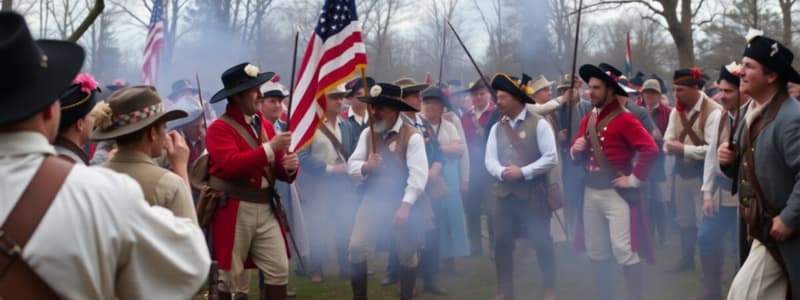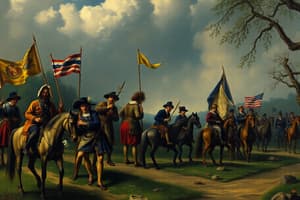Podcast
Questions and Answers
What was the main motivation behind the Boston Tea Party?
What was the main motivation behind the Boston Tea Party?
- To protest the introduction of taxes on tea
- To support British trade interests in the colonies
- To oppose the British East India Company's monopoly on tea sales (correct)
- To demand representation in the British Parliament
What was a direct consequence of the Boston Massacre?
What was a direct consequence of the Boston Massacre?
- The imposition of the Intolerable Acts
- The creation of the Sons of Liberty
- The repeal of most Townshend duties (correct)
- The establishment of the First Continental Congress
Which of the following was NOT a result of the Intolerable Acts?
Which of the following was NOT a result of the Intolerable Acts?
- Establishment of civilian courts in Boston (correct)
- Formation of the First Continental Congress
- Closure of Boston Harbor
- Increased troop presence in Massachusetts
What event did the Sons of Liberty use as propaganda to rally support against British rule?
What event did the Sons of Liberty use as propaganda to rally support against British rule?
What significant action did the First Continental Congress take in response to British policies?
What significant action did the First Continental Congress take in response to British policies?
What was a significant consequence of the Proclamation of 1763 for the colonists?
What was a significant consequence of the Proclamation of 1763 for the colonists?
How did the British government justify the introduction of higher taxes after the French and Indian War?
How did the British government justify the introduction of higher taxes after the French and Indian War?
What was a major reason for the formation of the Sons of Liberty?
What was a major reason for the formation of the Sons of Liberty?
Which act required colonists to purchase a stamp for printed materials?
Which act required colonists to purchase a stamp for printed materials?
What did the Daughters of Liberty primarily form to achieve?
What did the Daughters of Liberty primarily form to achieve?
Why did colonists feel that their rights were being violated after the French and Indian War?
Why did colonists feel that their rights were being violated after the French and Indian War?
What main issue did the Quartering Act address?
What main issue did the Quartering Act address?
Which territory did Great Britain gain control of as a result of the Treaty of Paris, 1763?
Which territory did Great Britain gain control of as a result of the Treaty of Paris, 1763?
What is commonly referred to as the 'shot heard ‘round the world'?
What is commonly referred to as the 'shot heard ‘round the world'?
Who wrote the rough draft of the Declaration of Independence?
Who wrote the rough draft of the Declaration of Independence?
Which event is considered the turning point of the American Revolution?
Which event is considered the turning point of the American Revolution?
What type of content does the 'grievances' section of the Declaration of Independence emphasize?
What type of content does the 'grievances' section of the Declaration of Independence emphasize?
Which pamphlet, written by Thomas Paine, urged colonists to seek total independence?
Which pamphlet, written by Thomas Paine, urged colonists to seek total independence?
What year did the Declaration of Independence get adopted?
What year did the Declaration of Independence get adopted?
Which part of the Declaration of Independence outlines natural rights?
Which part of the Declaration of Independence outlines natural rights?
What action did the Second Continental Congress take in response to the conflicts with Britain?
What action did the Second Continental Congress take in response to the conflicts with Britain?
What hardship did George Washington's army face during the winter at Valley Forge?
What hardship did George Washington's army face during the winter at Valley Forge?
Who was the primary author of the Declaration of Independence?
Who was the primary author of the Declaration of Independence?
What significant event occurred at the Battle of Yorktown?
What significant event occurred at the Battle of Yorktown?
Which figure is known for his famous quote, 'Give me Liberty, or Give me Death'?
Which figure is known for his famous quote, 'Give me Liberty, or Give me Death'?
Which document recognized the United States as an independent nation?
Which document recognized the United States as an independent nation?
Flashcards are hidden until you start studying
Study Notes
Salutary Neglect
- King ignored the colonies for years, allowing them to develop self-government
- Colonies were upset when the King began to control them
French & Indian War (1754-1763)
- Also known as the Seven Years War in Europe
- Fought over the Ohio River Valley
- Great Britain was victorious, signing the Treaty of Paris in 1763
- Great Britain received all the land east of the Mississippi River
- Colonists were excited to migrate West
Effects of the French & Indian War
- Proclamation of 1763 signed by King George III
- Stopped colonists from moving west to prevent conflict with Natives
- Angered colonists - their freedoms were limited
- British needed money to pay for the war (war debt)
- Believed they defended the colonists
- Colonists should help pay for the war (taxes)
Causes of the Revolution
- Proclamation of 1763 - Forbid colonists to move past Appalachian Mountains
- Sugar Act (1764) - Taxes on sugar and molasses
- Stamp Act (1765) - Required colonists to buy a stamp for printed papers (to maintain British soldiers)
- Newspapers, documents, playing cards, etc. required a stamp
- Sons of Liberty (led by Samuel Adams) formed to protect the rights of the colonists
- Convinced Parliament the Stamp Act would not be obeyed
- Daughters of Liberty formed to boycott British goods
- Provided boycotted goods to colonists
- First evidence of "No Taxation Without Representation"
- Colonists had no representatives in Parliament and shouldn't be taxed
- Quartering Act (1765) - Soldiers were allowed to stay in anyone's house
- Became the 3rd Amendment to the Constitution
- Townshend Acts (1767) - Customs duties (taxes) on British glass, lead, paints, paper, and tea
- Led to a boycott of British goods
- Boston Massacre (March 5, 1770) - Mob of colonists confronted British soldiers
- Soldiers opened fire, killing 5 colonists (first to die was Crispus Attucks)
- Parliament repealed most of the Townshend Duties
- Sons of Liberty & Samuel Adams used the incident as propaganda
- Called colonists innocent bystanders being attacked by British Redcoats
- Tea Act (1773) - Gave the British East India Company the sole right to sell tea in the colonies
- Colonists saw it as complete control of the tea trade
- Led to the Boston Tea Party
- Boston Tea Party (December 16, 1773) - Sons of Liberty, dressed as Mohawk Indians, boarded British ships in Boston Harbor
- Threw 342 chests of tea into the sea
- Led to the Intolerable Acts
- Intolerable Acts (1774) (Coercive Acts) - Laws closed Boston Harbor, shut down civilian courts, and placed Massachusetts under British control
- Sent more troops to Boston
- Prompted anger throughout the colonies and they began to work together to oppose British rule
- "Minutemen" began preparing for an organized fight with the British
- First Continental Congress (Sept 5, 1774) - Representatives met in Philadelphia
- Colonies decided to unite to protect their rights
- Called for a complete boycott of British goods
- Battle of Lexington & Concord (April 18, 1775) - First shots of the American Revolution (“shot heard 'round the world")
- 700 British soldiers marched from Boston to Concord to seize weapons
- Small battle in Lexington - no one knows who fired first
- British defeated the colonists
- British marched toward Concord where they were met by colonists and Minutemen
- Colonists won
"Common Sense" (January 1776)
- Written by Thomas Paine (recent immigrant from Great Britain)
- Convinced colonists that total independence was necessary (used as propaganda)
Second Continental Congress (Summer 1775- Summer 1776)
- Representatives met again in Philadelphia
- They had to decide what to do about the fighting
- Moved toward independence from Great Britain
Declaration of Independence (July 1776)
- The break-up with Great Britain - the war became more serious
- Committee of 5 were selected to write the document
- Thomas Jefferson wrote the rough draft (follower of philosopher John Locke)
- Adopted and signed by the Second Continental Congress on July 4, 1776
- “We hold these truths to be self-evident, that all men are created equal, that they are endowed by their Creator with certain unalienable rights, that among these are life, liberty and the pursuit of happiness.”
- Preamble (Intro) - Natural rights of the colonists (unalienable rights): Life, liberty, and the pursuit of happiness
- Grievances - Formal complaints
- Grievances were addressed or fixed in the Constitution and Bill of Rights
- Example: The King should not have imposed taxes without consent of the colonists
- The U.S. Constitution states “Congress shall have power to lay and collect taxes, duties, imposts and excises”
Major Battles/Events of the Revolution
- Lexington and Concord (1775) - First official battle of the American Revolution
- Battle of Saratoga (1777) - Turning point of the war
- Major colonial victory
- Helped convince France to help the Americans
- Winter at Valley Forge (1777-1778) - Washington spent winter training the army
- Faced hardships, including desertions and lack of food/supplies/funds
- Battle of Yorktown (1781) - Last official battle of the American Revolution
- British troops surrendered to the Continental army
- Treaty of Paris (1783) (Signed Sept 1783) - Great Britain forced to recognize the U.S.A as an independent nation
Important People of the Revolution
- John Adams - On the committee to write the Declaration of Independence
- Defended the British Troops in the Boston Massacre trial
- Samuel Adams - Leader of the Sons of Liberty
- Abigail Adams - Wife of John Adams
- Member of the Daughter of Liberty
- Helped begin boycotts of British goods
- Mercy Otis Warren - Wrote anti-British propaganda supporting independence
- Member of the Daughters of Liberty
- Benjamin Franklin - Famous scientist and Enlightenment Leader
- On the Committee to write the Declaration of Independence
- Crispus Attucks - African and Native American Descent
- First to die in the Boston Massacre
- King George III - King of England before and during the American Revolution
- Patrick Henry - Gave a speech with the "Give me Liberty, or Give me Death" phrase
- Thomas Jefferson - Primary author of the Declaration of Independence
- Thomas Paine - Author of Common Sense (Pro-independence pamphlet)
- George Washington - Commissioned as Commander in Chief of the Continental Army
- John Hancock - First man to sign the Declaration of Independence
- John Locke - Wrote many essays on natural rights
- Thomas Jefferson took Locke’s ideas of natural rights and turned them into ‘unalienable rights’
- John Paul Jones - Famous Naval Hero
- "I have not yet begun to fight"
- Marquis de Lafayette - French General/Military Advisor to George Washington
- Helped train troops at Valley Forge
Studying That Suits You
Use AI to generate personalized quizzes and flashcards to suit your learning preferences.




